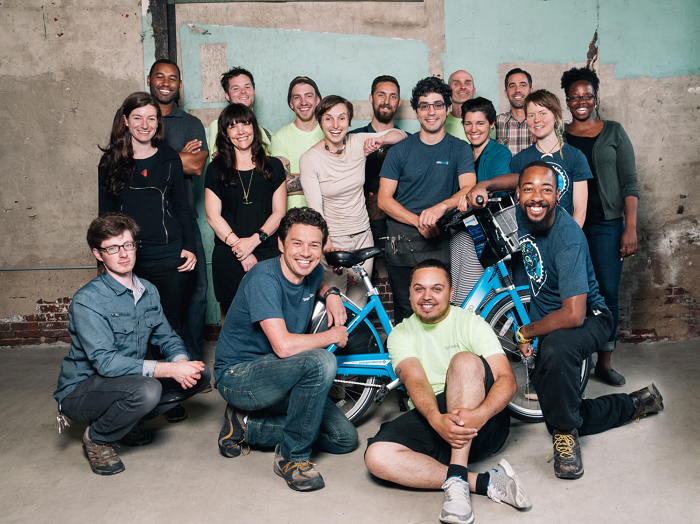Bike share company plans to internalize diversity and inclusion
by Stefani Cox
September 27, 2017
 Bicycle Transit Systems — Philadelphia office
Bicycle Transit Systems — Philadelphia office
Source: Bicycle Transit Systems
A major U.S. bike share operator has started planning for equity from a new angle — building an inclusive environment within its own offices.
Bicycle Transit Systems manages the bike share systems for Philadelphia, Los Angeles, Oklahoma City, and Las Vegas. It’s been in business since 2013, and is now starting to do some comprehensive self-evaluation around diversity efforts.
BTS President and CEO, Alison Cohen, sees this year as a crucial moment to be looking internally at diversity and inclusion.
“The initiative came partially from this volatile time in our society, since the [U.S. presidential] election,” said Cohen. “I see what we’re doing here as a microcosm — maybe we can figure out some real solutions to problems in our greater society.”
Looking inward was important to Cohen, given that much of BTS’ work is focused on diversity and ease of access to bike share on the ground. It only makes sense, she said, to also extend those efforts to their own company.
The challenge was figuring out how exactly to go about achieving a more inclusive workplace. BTS took action with a few beginning steps, which included conducting a survey, and opening up a new position to oversee the efforts.
Integrating inclusion into company culture
BTS surveyed all employees and took a look at the results to help figure out where to focus their initial planning and efforts.
“What we found in surveying is that what people want is just as much about normal team building and social events and connecting with other people, as well as learning opportunities related to race, gender, and culture,” said Cohen. “We want the diversity and inclusion programming to be a natural part of the company culture, and not simply a few trainings.”
Kiera Smalls, Marketing Manager for Indego at BTS, was selected for Chair of the Leadership Team for Diversity and Inclusion. The committee plans to meet once a month, using Google Hangouts to communicate across offices. Topics of inquiry will include recruiting practices, cultural programming, as well as advising senior leadership on inclusionary policies and practices.
“I truly believe we arrived at this largely due to our BBSP equity efforts in communities,” said Smalls. “And I’m excited to see us work to create real and impactful change inside the company as well.”
The initiative covers staff across all jobs types within the organization, including customer service, operations, and administration.
Senior leadership support matters
Smalls describes how a smooth relationship with senior leadership is critical to the diversity and inclusion process.
“Senior leadership has been really open to the idea of implementing diversity and inclusion into everything we do,” said Smalls. “They have been very intentional to say ‘Hey can you join this conversation or add input into this company-wide email with regard to D&I?’ I think that is huge. As the individuals who implement policies, procedures, and norms that impact employees and the communities we serve, their attention and support in this effort is critical.”
The diversity and inclusion team is also looking into current hiring practices and exploring how to expand beyond the usual few career sites where a job gets posted. Along the way, they want to develop cultural programming — such as lunchtime activities — that will celebrate multiple cultures and identities.
Measuring diversity and inclusion efforts
When asked what “success” would look like for the initiative, Smalls said that tracking results is definitely an important part of the work.
“Success means Bike Transit having a more robust network of resources to find diverse candidates, a calendar of events to increase cultural competency, and inclusion amongst staff and a high retention rate,” she said. “We’re looking into what we will specifically want to measure and will know more in the coming weeks.”
Cohen and Smalls emphasize that they are excited to be embarking on this journey now, while the company is still at less than 100 employees. This way, a strong foundation for diversity and inclusion will already exist as the company grows.
The next part of the work will be for the committee to create a strategic plan for the next one to three years.
The Better Bike Share Partnership is funded by The JPB Foundation as a collaborative between the City of Philadelphia, the Bicycle Coalition of Greater Philadelphia, the National Association of City Transportation Officials (NACTO) and the PeopleForBikes Foundation to build equitable and replicable bike share systems. Follow us on Facebook, Twitter and Instagram or sign up for our weekly newsletter. Story tip? Write stefani@betterbikeshare.org.
